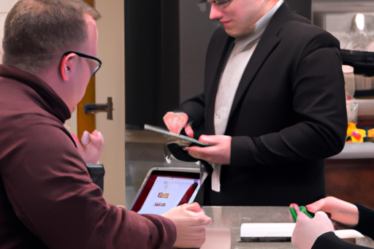
The Impact of GPT Models on Travel Booking and Planning
The travel industry has always been a dynamic and ever-evolving sector, constantly adapting to new technologies and trends. In recent years, the rise of artificial intelligence (AI) has brought about significant changes in the way people book and plan their trips. One of the most exciting developments in this field is the use of GPT (Generative Pre-trained Transformer) models, which have the potential to revolutionize the travel industry.
GPT models are a type of AI technology that uses deep learning algorithms to generate human-like text. They have been trained on vast amounts of data from the internet, allowing them to understand and mimic human language patterns. This makes them incredibly useful for a wide range of applications, including travel booking and planning.
One of the main ways in which GPT models are impacting the travel industry is through their ability to provide personalized recommendations. When planning a trip, travelers often spend hours researching destinations, accommodations, and activities. GPT models can streamline this process by analyzing a user’s preferences and generating tailored recommendations based on their individual needs and interests. This not only saves time but also ensures that travelers are presented with options that are most likely to meet their expectations.
Furthermore, GPT models can assist travelers in finding the best deals and discounts. By analyzing vast amounts of data from various travel websites and platforms, these models can identify the most cost-effective options for flights, accommodations, and activities. This can be particularly beneficial for budget-conscious travelers who are looking to make the most of their money.
Another area where GPT models are making a significant impact is in customer service. Travel companies are using these models to develop chatbots that can interact with customers in a natural and conversational manner. These chatbots can answer frequently asked questions, provide recommendations, and even assist with booking and itinerary planning. By automating these tasks, travel companies can provide round-the-clock support to their customers, enhancing the overall travel experience.
GPT models are also being used to improve the accuracy and efficiency of translation services in the travel industry. Language barriers can often be a challenge for travelers, especially when visiting countries where English is not widely spoken. GPT models can quickly and accurately translate text from one language to another, making it easier for travelers to communicate and navigate unfamiliar environments.
However, it is important to note that while GPT models have immense potential, they are not without their limitations. One of the main challenges is ensuring the ethical use of these models. As they generate text based on the data they have been trained on, there is a risk of bias and misinformation. It is crucial for travel companies to carefully curate and monitor the data used to train these models to ensure that the information provided is accurate and unbiased.
In conclusion, GPT models have the potential to revolutionize the travel industry by providing personalized recommendations, finding the best deals, enhancing customer service, and improving translation services. While there are challenges to overcome, the benefits of using GPT models in the travel industry are undeniable. As technology continues to advance, it will be exciting to see how these models further shape the way we book and plan our trips.
Enhancing Customer Experience in the Travel Industry with GPT Models

The travel industry has always been a dynamic and ever-evolving sector, constantly seeking ways to enhance the customer experience. In recent years, there has been a significant shift towards the use of artificial intelligence (AI) and machine learning to achieve this goal. One such technology that has gained considerable attention is the GPT (Generative Pre-trained Transformer) model.
GPT models are a type of AI language model that have been trained on vast amounts of text data, enabling them to generate human-like responses to prompts. This technology has been successfully applied in various industries, including healthcare, finance, and customer service. Now, the travel industry is also exploring the potential of GPT models to revolutionize the way customers interact with travel companies.
One of the key areas where GPT models can enhance the customer experience is in personalized recommendations. By analyzing a customer’s preferences, past travel history, and other relevant data, GPT models can generate tailored recommendations for destinations, accommodations, and activities. This not only saves customers time and effort in researching and planning their trips but also ensures that their travel experiences align with their individual preferences.
Moreover, GPT models can also assist customers in making informed decisions by providing them with real-time information about travel restrictions, weather conditions, and local events. This is particularly valuable in today’s fast-paced world, where travel plans can change at a moment’s notice. By leveraging GPT models, travel companies can keep their customers updated and help them navigate any unforeseen circumstances that may arise during their trips.
Another area where GPT models can make a significant impact is in customer support. Traditionally, customers have had to rely on call centers or chatbots that often struggle to provide accurate and helpful responses. However, GPT models have the potential to revolutionize customer support by offering more intelligent and context-aware assistance.
With GPT models, customers can engage in natural language conversations, asking questions and seeking guidance just as they would with a human travel agent. The models can understand the nuances of the customer’s queries and provide relevant and accurate information in real-time. This not only improves the overall customer experience but also reduces the burden on customer support teams, allowing them to focus on more complex and specialized tasks.
Furthermore, GPT models can also be utilized to enhance the booking process. By integrating with existing travel platforms, GPT models can streamline the booking experience by providing customers with personalized recommendations, assisting them in finding the best deals, and even helping them navigate through complex itineraries. This not only simplifies the booking process for customers but also increases conversion rates for travel companies.
However, it is important to note that while GPT models offer immense potential, they are not without their limitations. One of the main challenges is ensuring the models’ ethical use and avoiding biases in their responses. Additionally, GPT models may struggle with understanding context and may generate inaccurate or irrelevant information. Therefore, it is crucial for travel companies to continuously monitor and fine-tune the models to ensure their effectiveness and reliability.
In conclusion, GPT models have the potential to revolutionize the travel industry by enhancing the customer experience in various ways. From personalized recommendations to real-time information and intelligent customer support, GPT models can significantly improve the way customers interact with travel companies. However, it is important for travel companies to carefully implement and monitor these models to ensure their ethical use and accuracy. With the right approach, GPT models can unlock new possibilities and create a more seamless and enjoyable travel experience for customers.
Leveraging GPT Models for Personalized Recommendations in Travel
The travel industry has always been a dynamic and ever-evolving sector, constantly adapting to new technologies and consumer demands. In recent years, the rise of artificial intelligence (AI) and machine learning has revolutionized the way businesses operate, and the travel industry is no exception. One of the most exciting developments in this field is the use of GPT (Generative Pre-trained Transformer) models to provide personalized recommendations for travelers.
GPT models are a type of AI model that have been trained on vast amounts of data, enabling them to generate human-like text and understand context. Leveraging this technology, travel companies can now offer tailored recommendations to their customers, enhancing their travel experiences and increasing customer satisfaction.
One of the key advantages of using GPT models for personalized recommendations in travel is the ability to understand individual preferences. By analyzing a user’s past travel history, preferences, and even social media activity, GPT models can generate recommendations that are highly relevant to the individual. For example, if a user has previously shown a preference for beach destinations and luxury accommodations, the GPT model can suggest similar destinations and hotels that align with their preferences.
Furthermore, GPT models can also take into account external factors such as weather conditions, local events, and even current trends. This allows travel companies to provide real-time recommendations that are not only personalized but also timely. For instance, if a user is planning a trip to a city during a major music festival, the GPT model can suggest nearby hotels and attractions that are likely to be of interest to the user during their stay.
Another benefit of leveraging GPT models for personalized recommendations in travel is the ability to offer a seamless and integrated experience. By integrating the GPT model into their existing platforms, travel companies can provide users with a one-stop-shop for all their travel needs. From booking flights and accommodations to suggesting local restaurants and activities, the GPT model can offer a comprehensive and personalized travel itinerary.
Moreover, GPT models can also assist travelers in discovering hidden gems and off-the-beaten-path destinations. By analyzing a user’s preferences and travel history, the model can suggest unique and lesser-known locations that align with their interests. This not only adds an element of surprise and excitement to the travel experience but also helps to alleviate overcrowding in popular tourist destinations.
However, it is important to note that while GPT models have immense potential in the travel industry, they are not without their limitations. One of the challenges is the need for a large amount of high-quality data to train the model effectively. Travel companies must ensure that they have access to diverse and accurate data to provide reliable recommendations.
Additionally, privacy concerns also need to be addressed when using GPT models for personalized recommendations. Users must have control over their data and be able to opt-out if they do not wish to receive personalized recommendations. Transparency and clear communication regarding data usage are crucial to building trust with customers.
In conclusion, the travel industry has a vast potential to leverage GPT models for personalized recommendations. By understanding individual preferences, considering external factors, and offering a seamless experience, travel companies can enhance customer satisfaction and provide unique travel experiences. However, it is important to address challenges such as data quality and privacy concerns to ensure the responsible and effective use of GPT models in the travel industry. With the right approach, GPT models have the power to transform the way we explore the world.


